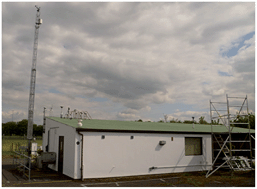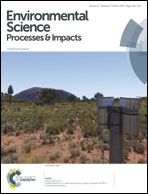Influences on and patterns in total gaseous mercury (TGM) at Harwell, England†
Abstract
Total gaseous mercury (TGM) was monitored during 2013 at the rural monitoring site, Harwell, England using the Tekran 2537A monitoring system. Average TGM for the year was 1.45 ± 0.24 ng m−3. This is comparable to other northern hemisphere studies, but on average 0.5 ng m−3 higher than at its sister monitoring station at Auchencorth Moss, Scotland, but 14% lower than that found in a similar study at the same location of 1.68 ng m−3 in 1995/6. Using wind sector analysis we show the important influence of local emissions, with our data showing that the largest influence on TGM observed is that of the adjacent Science & Innovation campus, making the site more a ‘suburban background’. By using co-located measurements of black carbon and sulphur dioxide as tracers, we present an initial investigation into the impact of the closure of Didcot A coal fired power station, which ceased operating in March 2013. Further analysis using air mass back trajectories shows the long-range contribution to TGM from continental Europe, and that the lowest levels are associated with marine air masses from the west.


 Please wait while we load your content...
Please wait while we load your content...